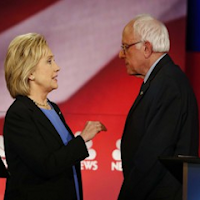While NBC's ratings beat out the last two Democratic debates it isn't even close to the first Democratic debate hosted by CNN, which brought in 15.3 million viewers. ABC had about 7.8 million viewers and CBS had about 8.5 million viewers opposite the debate on NBC.
The uptick in audience share last night, over the last two DNC debates, could be the result of the last two debates were also held on Saturdays, which typically see lower ratings than Sundays. The third debate on the Saturday before Christmas day on ABC attracted only 6.71 million viewers. The second debate attracted 8.5 million viewers on a mid-November Saturday when two Iowa university football teams matched off. And interest may have increased with Sen. Bernie Sanders (I-Vt.) closing the polling gap with former Secretary of State Hillary Clinton in early voting states Iowa and New Hampshire, which has resulted in Clinton going on the attack against Sanders by pointing out their differences on health care and gun control.
The Republican debates have all lacked what the Democratic debates have. This was another substantive debate among the Democrats, devoid of the histrionics, name-calling, and fact-free pronouncements that are pro forma in the Republican presidential debate shows. The Democratic candidates disagree on how to achieve certain policy goals, but they all agree on those big goals. Democrats have a real vision for the country. There isn’t a battle for the direction of the party happening on the Democratic side.
Any of three Democratic candidates would make a better president than any of the dozen Republicans running for the White House. Democrats demonstrated their competence and ability to govern during the NBC debate. Clinton, Sanders, and O’Malley have the policies that are missing on the Republican side. While Republicans fight the culture wars and rage against the nation’s changing demographics, Democrats are speaking to the real problems of ordinary Americans.
Case in point -- When Hillary Clinton and Bernie Sanders were asked if they saw any scenario where ground forces could be used to combat ISIS. Former Sec. Clinton said, “absolutely not.” Sanders blasted Republicans for not learning the lessons of Iraq, and he said that using ground forces to combat ISIS would lead to perpetual war and be a complete disaster. Sanders said that ISIS won’t be destroyed with American troops in perpetual warfare. Martin O’Malley said that he believed that President Obama was doing the right thing. O’Malley said that he appreciates that Democrats don’t use the term boot on the ground.
But that's not to say the fourth Democratic debate was all kumbaya. Clinton and Sanders presented different visions on their approach to governing – big ideas verses pragmatism. While Sanders urged his audience to “think big,” Clinton repeatedly cautioned thinking big is not pragmatic.
- Associated Press: “Their heated rhetoric highlighted the central question fueling the increasingly competitive primary race: Will the Sanders passion beat out the Clinton practicality?”
- ABC’s Rick Klein: The debate re-framed the race as “a battle pitting the party’s head against its heart.
Fact checkers of the last Democratic Debate found that nearly all of the major claims made by the candidates were actually true.



